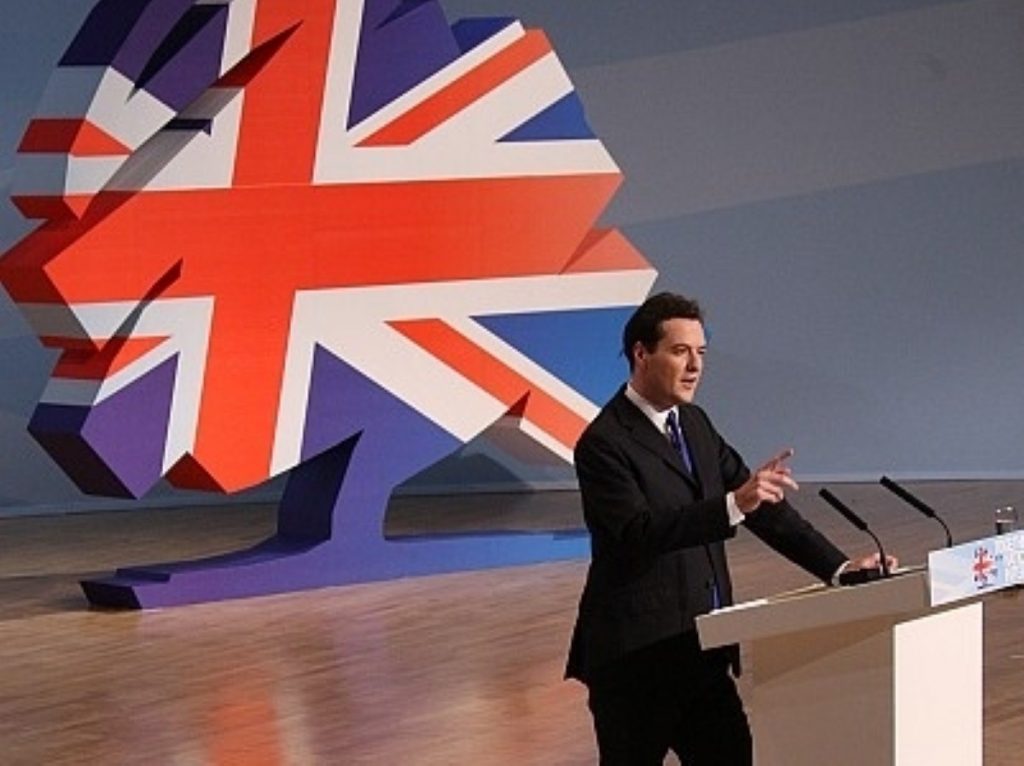Sketch: Smiling Osborne prepares to wield the axe
George Osborne’s join-the-dots speech was outshone by a shadowy presence in the seventh row.
It was the relief of the man who knows there is no other way. “Any other road leads to ruin,” he explained, in one of the many cuts clichés sprinkled through his first speech to a Conservative conference as chancellor. Labour were to blame because “they failed to fix the roof when the sun was shining”. Getting through this “continuing storm” required the drastic actions which are now just 16 days away. All is well, though. For we’re all in this together.
This style of join-the-dots speechifying is always an easier task than actually making hard choices. Perhaps this was why Osborne seemed so much more relaxed than last year, when he sneered and grimaced his way through a supercilious speech of abject misery. The tough work is almost done.


Many of the tough decisions may have already been taken. After fractious negotiations with Iain Duncan Smith a deal has finally been done on “a radically new welfare state”. The move to scrap child benefit for the highest earners was unveiled earlier today. The “very difficult decisions” on defence are being wrapped up (by putting off the call on Trident). So back in the Treasury the work must now be on finalising the details as October 20th approaches.
This explains Osborne’s grateful smile, his relief at being in power and nearly having got the job he’s been building up to for months all but out of the way. He began excellently, telling delegates he had good and bad news to offer. Both, it turned out, were that the party were in government after Labour had messed it up. “Once again we’re going to have to clean up that mess,” he said, the sneer briefly flickering back to life.
It’s true there were not many light moments, but then this isn’t the time for celebration. Only the opposition and their new leader Ed Miliband seemed fair game. An especially lame effort about Liam ‘no money left’ Byrne was followed by an excellent gag about cooperation with Vince Cable. “People said we wouldn’t get on, that we’d knife each other in the back, that we’d try to end each other’s careers. Who do they think we are? Brothers?”
He ploughed on, gleefully subverting expectations with a deft acknowledgement that his decisions are influenced by ideology, after all. Yes, there were short-term problems to deal with. “There’s nothing automatic about our prosperity,” he said. But there was a positive vision of a better future on offer. “Over the horizon is a Britain that pays its way in the world, that is a beacon for liberty and justice.” There was no rhetorical climax to this, no passion as he looked ahead. This writer’s attention wandered.
There is a legitimate excuse for this. Shots on the big screen of David Cameron’s rosy-cheeked face suggested he was somewhere in the audience. Yet he was not in the front row, where party leaders have since time immemorial been positioned. My perch high up on the right-hand-side of the Symphony Hall commanded views over the heads of those in the rows nearest the front. Yet, despite much practice from many hours in the Commons, Cameron could not be spotted. Where exactly was he?
It was only when Osborne opted to praise his leader that it became obvious. Applause broke out for the Tory leader. Far back, one seat in from the aisle on the seventh row from the front, a dark-haired man was the only Tory in the room not clapping. How novel that, somewhere in amongst the audience, the prime minister of Great Britain and Northern Ireland was seated.
Back on the stage, now relegated to only a minor secondary point of interest, Osborne was wrapping up. That sad smile seemed to be being painted in words as he talked of living in troubled times.
“You don’t get to choose the times in which you live,” he said, meaning the times in which you govern. “But you do get to choose how you live them.” We’ll find out exactly how on October 20th.

